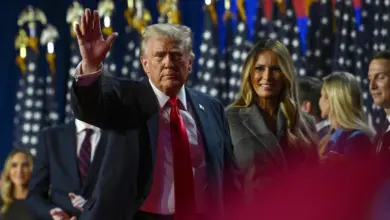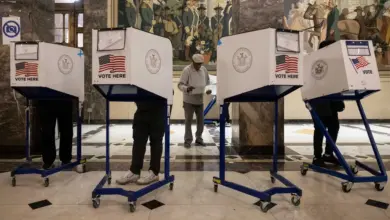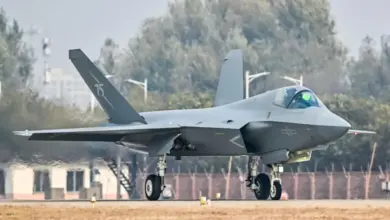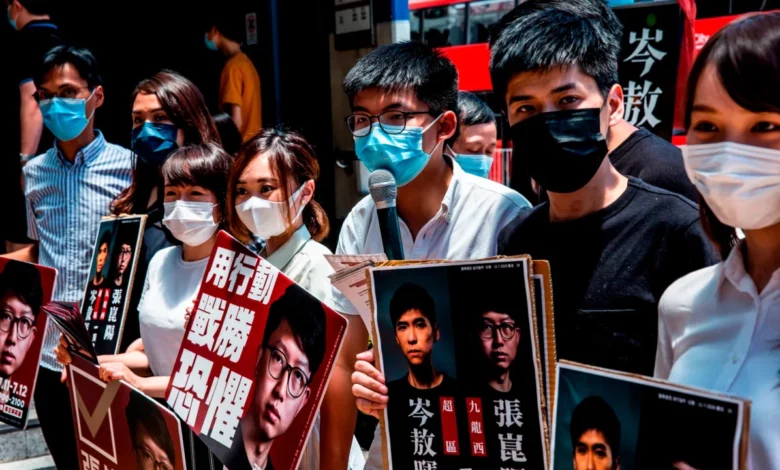
Dozens of Hong Kong’s most prominent pro-democracy figures are one step closer to learning their fate in the city’s largest national security case to date, as prosecutors and lawyers are returning to court Wednesday to make closing speeches almost three years since the mass arrests.
The 47 activists and politicians were charged with “conspiracy to commit subversion” for their roles in holding an unofficial primary election in 2020 to decide who should contest city lawmaker elections.
Those on trial say that plan was simply part of the pluralistic, oppositional politics that has long been permitted in Hong Kong. Prosecutors argue it amounted to a “massive and well-organized scheme to subvert the Hong Kong government.”
If convicted, they could face a maximum punishment of life imprisonment.
The prosecution is the most sweeping crackdown on Hong Kong’s pro-democracy camp since Beijing imposed a national security law on the semi-autonomous city in 2020 following mass anti-government protests the previous year.
For critics, the fate of the “Hong Kong 47,” as the defendants have come to be known, provides a stark window into how the national security law has curtailed political dissent and activism in the once outspoken city – even through channels once permitted in its partial democracy.
Most of the accused have been held in detention for more than two years in a case that is being closely watched for how Hong Kong’s judiciary, long a cornerstone of the international financial hub’s success, will apply the national security law at a time when Beijing is tightening its grip.
The Hong Kong government has repeatedly denied the national security law is suppressing freedoms. Instead, it insists the law has ended chaos and “restored stability” to the city.
The 47 defendants include seasoned politicians, elected lawmakers and young protest leaders, as well as academics, unionists, journalists and medical workers. They hail from multiple generations and a wide political spectrum – from moderate democrats to those who advocate for Hong Kong’s self-determination.
Among some of the more well-known figures are Joshua Wong, 27, who gained international fame as the face of Hong Kong’s years of student-led democracy protests, Benny Tai, 59, a legal scholar and co-founder of the 2014 Occupy Central movement, and Claudia Mo, 66, a former journalist-turned-legislator.
A large police presence was visible outside the courthouse on Wednesday morning, with officers patrolling the premises on all sides.
One supporter, Alexandra Wong, was escorted away by the police for a search after waving a British flag outside the court.
Known as “Grandma Wong,” the 67-year-old had been a fixture of Hong Kong’s pro-democracy protests. She returned to the court later and held up a sign that read “Free 47, free all.”
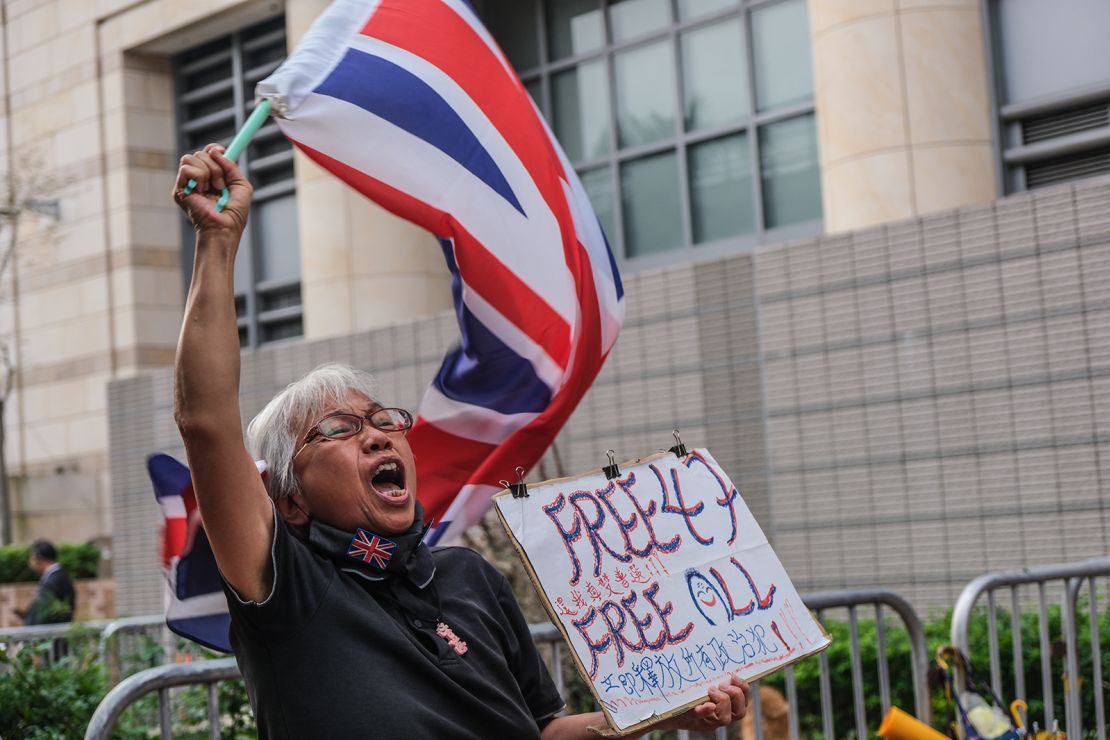
Long-winding legal process
The 47 democracy advocates were arrested en masse in a dawn raid in January 2021 and charged two months later. Thirty one have pleaded guilty, a move that in Hong Kong can lead to a reduced sentence.
The West Kowloon Court started hearing their case in February this year. After 116 days of hearings, lawyers for the 16 defendants who pleaded not guilty have now returned to court to make their final effort to vouch for their clients’ innocence.
As the hearing began on Wednesday, supporters filled the public gallery of the courtroom. Some yelled the names of activists as they were brought into the dock. The defendants waved back in acknowledgement.
Among those pleading not guilty are former journalist Gwyneth Ho, 33, who live-streamed a mob attack on pro-democracy demonstrators inside a subway station, and former lawmaker Leung Kwok-hung, 67, known by the nickname “Long Hair” and for his feisty, decades-long presence on the front lines of the city’s pro-democracy movement.
Meanwhile, prosecutors are expected to advance the last stretch of their argument on why the activists behind the dock should be convicted.
It is expected to take days for the prosecutors and defense lawyers to wrap up their final speeches, which run up to more than a thousand pages of legal documents submitted to the judges.
The three judges presiding over the case said during the hearing Wednesday they would need another three to four months to return the verdict.
The charges revolve around a primary election the opposition activists and politicians held in July 2020 to select what they say were the best candidates for the Legislative Council election scheduled originally for later that year.
Such inter-political camp contests are common in democracies around the world. And while Hong Kong has never been a full democracy, for many years after the 1997 handover from Britain to China a minority opposition was tolerated.
But that once outspoken landscape was transformed in the wake of both the huge and sometimes violent 2019 democracy protests and a landslide win for opposition figures in local district council elections at the end of that same year.
The pro-democracy camp had hoped to use the primary to make sure it won enough seats in the legislature to block government bills.
Authorities in Hong Kong said the primary vote was a “vicious plot” intended to “paralyze the government and undermine state power” by winning a majority of seats and using the mandate to block legislation.
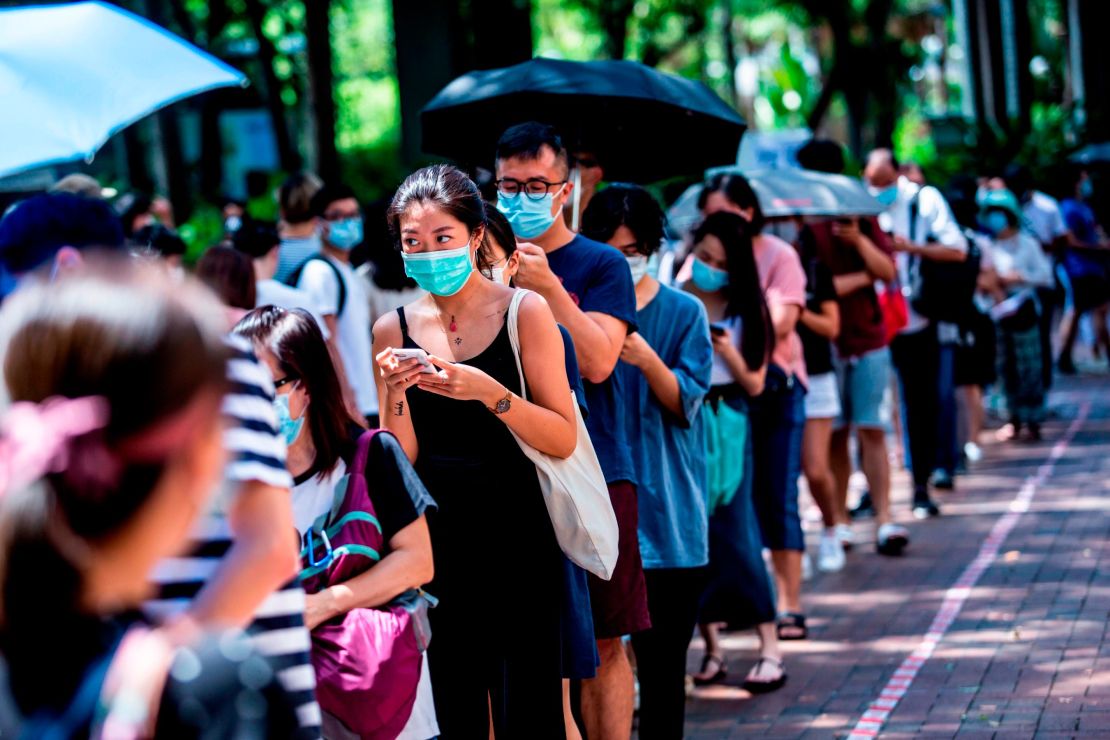
Sweeping changes
Hong Kong’s democracy activists are no strangers to courtrooms. Many have been tried before, and served time, for their activism. But the trial of the “Hong Kong 47” is the largest single prosecution of democracy leaders under Beijing’s rule and is being closely watched, both in the city and overseas.
The trial provides a fresh glimpse into how Hong Kong’s legal system has changed under the national security law, which criminalizes secession, subversion, terrorism, and collusion with foreign powers and carries a maximum punishment of life imprisonment.
In mainland China, the courts are tightly controlled by the ruling Communist Party and have a conviction rate above 99.9%. In contrast, Hong Kong follows a common law system that had been kept intact after the former British colony was handed back to Chinese rule in 1997.
But national security cases are setting new legal precedents.
The trial of the “Hong Kong 47” has been heard without a jury, deviating from the common law tradition, a power granted by the Beijing-imposed law. It is presided over by a bench of three High Court Judges designated by the city’s Chief Executive to handle national security cases. No national security cases in the city have been heard in front of a jury.
The law also places a higher threshold for bail. Thirty-two defendants have been denied bail and have been in detention since 2021 – a highly unusual practice for cases that do not involve murder. Only 15 were granted bail, but two of them had their application revoked later for breaching bail conditions.
It also provides an option for cases to be transferred to the mainland for trial under extreme circumstances. The city’s Chief Executive, John Lee, was asked whether a recent proposed bipartisan bill in the US calling for sanctions on Hong Kong officials, judges and prosecutors involved in national security cases would result in the transfer of cases across the border.
“I have confidence that Hong Kong can handle that national security risks we are facing, including some existing cases, especially the big cases,” Lee said, placing his faith on the city’s judges and law enforcement officers.
Legal scholars and Western governments have lamented how the national security law has dealt a blow to the city’s judicial independence, but authorities in Beijing and Hong Kong have argued it’s a matter of national security and warned foreign parties against interfering in the city’s internal affairs and judicial system.
Before the trial began in February, the Hong Kong government called criticism on the trial “scandalising of the criminal justice process” and “a blatant act undermining the rule of law of Hong Kong.”
The Legislative Council election – which the defendants had hoped to win by holding the primary vote – was postponed to 2021 due to health concerns cited by the authorities during the coronavirus pandemic.
During the postponement, Beijing and Hong Kong authorities rewrote the city’s electoral rules, putting in place a stricter screening system to weed out candidates deemed “unpatriotic.”
Hong Kong’s Legislative Council currently has no pro-democracy lawmakers, and the upcoming district council elections, to be held in December, also do not feature any pro-democracy candidates.

